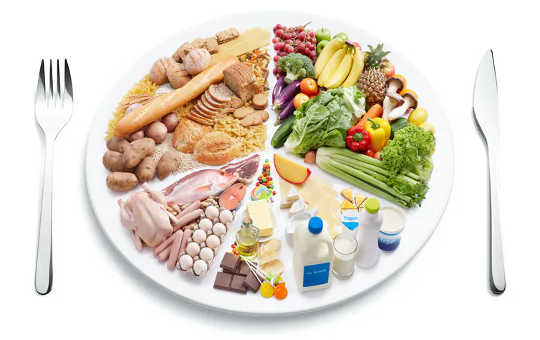
Many dietary guidelines fail to define what “variety” means. Ekaterina Kondratova/ Shutterstock
It’s well known that a healthy diet can help reduce disease risks that are related to overweight or obesity – such as some cancers, cardiovascular disease and diabetes. As part of a healthy diet, experts around the world advise people to consume a variety of foods. In the UK for example, the NHS’s Eatwell Guide divides foods into food groups (starchy carbohydrates, fruit and veg, dairy or dairy alternatives, proteins, and fats). To get a “balanced diet”, the guide advises people to aim to eat a certain amount of food from each food group.
One reason food variety is included in recommendations is because different foods have different nutrients. Eating a varied diet can benefit our health by reducing risks associated with malnutrition, which happens when we don’t get the right amount of nutrients from our diet. Malnutrition can cause weak muscles, decrease mobility, increase illness, and lead to breathing problems, among other symptoms.
But what’s defined as “variety” by dietary guidelines can often be confusing and too simplistic – and vastly different from what the general public may define as variety. Research has shown that in addition to having variety as part of the whole diet, we can measure variety within meals (for example, having multiple courses, or foods from different food groups on our plate) as well as across meals (such as having different foods for lunch each day).
Importantly, research has also found that variety can refer to foods that differ in their characteristics (such as their appearance, flavour, texture or smell), as well as the nutrients found in them. By this definition, eating a chocolate cake and strawberry cake would be a form of variety, as they differ in flavour, despite having a very similar nutritional profile and belonging to the same food group. It also means that single foods and dishes with mixed ingredients (such as pizzas or sandwiches) can have variety.
Get The Latest By Email
At the moment, UK dietary guidelines rely on people using their own discretion to achieve an overall balance of different foods in their diet. But is it easy for consumers to identify variety?
In our recent study, we wanted to find out if people living in the UK recognise food variety – and how they define it. To do this we asked participants to comment on a range of photographs that showed different types of food as part of an online survey. For example, they were shown supermarket aisles displaying different food brands, meals that consisted of multiple foods from different food groups, and mixed dishes and foods that contained different flavours, colours, and textures – such as salads with a mix of vegetables, or pizzas with different toppings.
Though participants often identified and discussed different types of variety, they tended to only define variety as eating foods from different food groups as part of the whole diet, a definition that is consistent with the use of variety in dietary guidelines. These results suggest that, when trying to follow dietary guidance and eat a healthy diet, people may place less importance on variety within meals. For example, if we just need to achieve an overall balance, then they may believe it doesn’t matter if we have less or more variety within a meal as long as we make up the difference in the next meal.
 People may place less focus on getting variety as part of their whole diet. ifong/ Shutterstock
People may place less focus on getting variety as part of their whole diet. ifong/ Shutterstock
Thinking about variety within meals is important, because research shows that people eat more when meals and foods differ in appearance, taste and texture within the same dish. Each new food characteristic that we experience keeps us interested in a meal for longer, subsequently delaying the feeling of fullness that would normally prompt us to stop eating.
In other words, variety in these characteristics disrupts the process known as “sensory specific satiety”. This effect can increase the risk of overeating. For this reason, eating a variety of foods from within food groups (with the exception of fruits and vegetables) has been related to having a higher body weight. This type of variety could then potentially increase disease risks linked to overweight or obesity.
Variety and health
As variety encourages us to eat more, variety within meals may be most helpful when eating fruits and vegetables. This is not only because they are less caloric than other food groups, but more nutritious (they contain important vitamins and minerals) – so eating a greater variety of fruits and vegetables can benefit our health. But it can be less helpful when eating high-calorie foods, when the risk of overeating is higher.
For example, we could make sure that we have two or more servings of different vegetables on our plate at dinnertime to increase the amount of vegetables we eat. When eating high-calorie foods, we could choose options that in and of themselves have less variety, such as plain chocolate instead of those with flavoured fillings.
For dietary guidelines to be useful, they need to be more specific about what variety means, and how we can monitor variety in our diet. While eating food from different food groups helps us achieve a diet rich in different nutrients, we should also be mindful of the effects of variety on how much food we eat during meals. To get the right balance, variety should be encouraged within some food groups such as fruits and vegetables – but not others.
About the Authors
Rochelle Embling, PhD Researcher in Psychology, Swansea University; Aimee Pink, Research fellow, Swansea University; Laura Wilkinson, Lecturer in Psychology, Swansea University, and Menna Price, Lecturer in Psychology, Swansea University
This article is republished from The Conversation under a Creative Commons license. Read the original article.
books_nutrition







